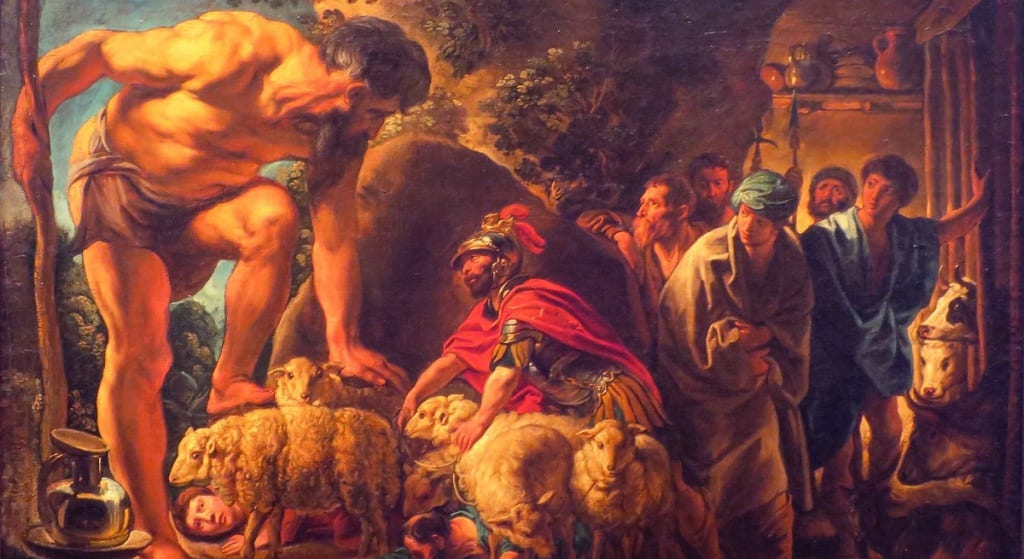
Odyssey human laws
Odysseus is one of the greatest stories we can learn from, not only for its tradition and history, but in a practical sense. We discover that there are laws about a happy life through adversities in the book of the famous traveler and a Coursera course in greek myths:
- Nostalgia is one the most powerful force in the universe. When people are looking back to their past they always imagine that it must have been better, we formulate the famous «what if I’ve done…» or «what would have happened if…». Telemachus has his cue, it’s time to go and off he goes. He’s going to visit two amazing places before going home. Athena’s going to bring him along. He’s going to see Nestor’s coastal city. And when he does, he’s going to move from the his edge of his island of Ithaca and have a trip down by boat to Pylos.
- If you want to persuade people, you should know your audience: what they like, feel and what they are being going through. You can’t say all the stuff you might want to say, for example: «Let me unburden you with all the awful things that I’ve been through» knowing they have suffered other things. Odysseus needs to get inside of the head of his audience, which is this young woman Nausicaa. And what he does is look for ways to make her feel good. Flattery is a great way to start a persuasive speech, charm. Express yourself in a way that’s honest to your own situation: being cast away and without resources like our hero. Odysseus learning people’s minds and he sets right up with a speech that he knows is going to help soften her with respect to her ability to make a connection with him. He goes round the speech gets from the flattery to positioning himself, talking about what a lowly person he is. And concludes in a persuasive way hinting his desire like I hope you get everything you want in life, and may the gods bring you a husband, a house, and lasting harmony. And he wins over affection from her so she wants to help him, she’s ready to give him some clothes to this foreigner that charmed her in her life’s needs and not in a superficial way.
- It’s not good to be food. Human beings do not like the idea of becoming food for other creatures. It’s not just terrifying or frightening, it’s utterly disgusting. The violence that’s involved in killing is terrible but to be chewed on, swallowed and metabolized is disgusting. This reminds us what nature’s law is all about: the survival of the fittest, whatever living things that are out there in the world survive, and humankind is part of that food chain. Odysseus has a clever idea of debilitating the Cyclops rather than killing him by tricking them with his name: «Nobody».
- Making leadership decisions means choosing between two bad things. When a person’s put into a position of leadership, they have to make those calls. When his crew mates are turned into sheep, Odysseus is the one who decides that some of his men are going to die, and they get eaten by this creature right here. Awful kind of thing he has to run into. So, this is now having known all things, having made the tough call that is required for him to get his ship through intact through these awful things. He is told to steer clear of this they want to make sure that they stay away from this awful potential problem but Odysseus’s men prevail and they land on the cattle of the sun, when the winds blow in the wrong direction they’re stuck and they are stuck without food. There needs to be a sacrifice: cattle are what we do when we want to give a gift to the gods.
- When you tell a lie, you should tell a lie that’s close to the truth. This lets you inhabit the lie as though you really lived it because it’s close to something you knew and if you’re ever about to get caught out in something , what you say in your lie, as long it’s close to what really happened, there’ll be a way for you to fill in whatever gap shows up later. When Odysseus gets home he disguises as another persona so he can get to his wife Penelope, but to convince others he need to lie. So Odysseus tells a story that is rife with all kinds of adventurous details about someone being blown from pillar to post, it involves some engagement in Troy, it talks about the heroes there. This helps Odysseus inhabit that story persuasively, make it seem like it’s true and gives him a way to avoid getting caught out. At the end of this long story though, that Odysseus tells, Eumaeus has this wonderful reaction to it.
- To grow up means to take on other people’s messes. But Telemachus is stepping up to do that and ready to do it. Others seem to notice that this is going on. There needs to be someone to take responsibility.
- Knowledge that not everybody knows, but only a select few know. Secrecy creates intimacy. Proprietary knowledge makes people feel closer together with what binds the relation together. Odysseus and Penelope demonstrate that in the final riddle to prove that his lover is back.
- A deep connection to the land is a common. There is get great pride when claiming to have been connected to the land. The idea of being dislocated and wandering, as Odysseus embraces, is also a little bit, disconcerting, and to think that you have an actual rooted connection to a land, is a nice thing to have. There’s a Greek term for this, called autochthony. Even nowadays we have trouble getting on the road to where life leads, instead we prefer to stay home to what we know than to explore new ways of life.
- Have a pet. If someone would like a person someone else to have an amorous attraction to them, having a puppy on your lap is not a bad thing. It means that, you can exhibit to the person, the puppy automatically melts a person’s heart and makes the person think, oh wow, this is so cute and we want to come over and pet it. Then also, if that person who has the puppy on, on, on, on his or her lap, actually takes care of the little thing, well chances are maybe the person might be a good person to have around in you know, longer term relationship. So puppies are useful ways of getting people’s attention and expressing to them in some sense that, you yourself might be kind of having your act together enough to care for something else so you might be a worthy mate for that person. Well, the way Virgil tells the story having Aeschaeneus be the, the object that makes Ido turn from just admiring the abstract, this figure of Aeneas, to falling passionately, deeply in love with him is kind of interesting.
- People at the top of the power structure and people at the bottom of the power structure tend to embrace the idea that history is moving toward some predetermined end point or teleology. Everything works for a purpose. And everything tends to end they way it has been written or determined, there is also a why to explain things: and that’s life and what the gods desire. To think that it wasn’t your fault, and that instead there’s some, all of these larger purposes that are acting in the historical times, but they just don’t happen to include you. So it exonerates you from the sense of having to feel like whatever position you’re in is one that you somehow deserve. So the, the temptation I think, for folks on both ends of a power structure is there to embrace the ideal of teleology («I won because I am a winner», «I lost because I am a loser»). Those in the middle. Who have aspirational goals of moving up social and cultural ladders, don’t like this idea, that history moves toward a predetermined end. It’s more interesting to those at either end of the spectrum of political and social influence on power.




Deja una respuesta